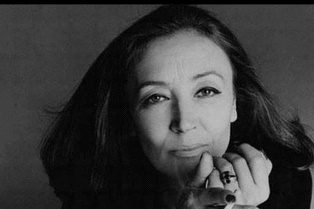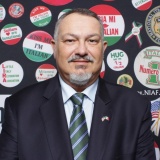
WTI Magazine #43 2014 September, 17
Author : Giuseppina Salzano e Giovanni Verde Translation by:
In the review of world literature and journalism, the figure of Oriana Fallaci has often appeared controversial, argumentative, hard to decipher. But behind the curtain of improvised judgments, professional rivalries and political exploitations, over the years Oriana Fallaci has been able to represent the strength of the freedom of her own ideas, the constant consistency with her own principles, beyond the conveniences of the moment and the media opportunism.
First Italian woman to be hired as a war correspondent, Oriana Fallaci was born in Florence on June 29, 1929. Her father, Edoardo, was a militant anti-fascist who decided to involve his daughter soon into the Resistance as a look-out.
After the war, once left the faculty of medicine to which she registered after classical studies, she follows the path of journalism. She begins her career in the newspaper "Il Mattino dell'Italia centrale", from which she will be fired for refusing to write an article in favor of the Italian communist leader Palmiro Togliatti, as suggested by her director.
After working in Milan with the weekly magazine "Epoca", in 1956 Oriana Fallaci arrives for the first time in New York, to write about celebrities and socialites. Her articles will be collected in her first book, "I sette peccati di Hollywood" (The Seven Deadly Sins of Hollywood), with a preface by Orson Welles.
The 60s will be the years of her definitive success. Fallaci writes "Il sesso inutile - Viaggio intorno alla donna" (The useless sex) in 1961, about the status of women in the Middle East; and "Penelope alla Guerra" (Penelope at war) in 1962, the story of an Italian girl who goes to New York, where she will meet people from her past. In 1965 she writes "Se il sole muore" (If the sun dies), a work that collects her interviews with engineers and NASA astronauts who were preparing to land on the Moon.
It is 1967 when the reporter leaves for the Vietnam war front as a war correspondent for the Italian magazine "L'Europeo". In seven years she will return to Vietnam twelve times, criticizing both sides, recounting the cruelty of that war but also heroic and deeply human moments of what she called "a bloody madness".
In 1968she gets back to the United States to write about the assassinations of Martin Luther King and Bobby Kennedy, and the student riots. In this regard she criticize "bourgeois vandalism of students who dare to invoke Che Guevara while living in homes with air conditioning, going to school driven by daddy's big cars and going to the nightclub wearing silk shirts".
In 1969 she attends the mission of Apollo 11, the moon landing. In 1970 she will recount the experience in the book "Quel giorno sulla luna". Later, the commander of Apollo 12 Charles Conrad will ask Fallaci an advice about the sentence he would state once on the moon. Recalling the famous Neil Armstrong phrase "That's one small step for aman, one giant leap for mankind", and noting Conrad's shortness, the writer will advise the commander the phrase "that may have been a small one for Neil, but it's a long one for me". Conrad, once on the moon, will deliver exactly that phrase.
In 1975, Oriana Fallaci will release her first book ot regarding a journalist matter, "Lettera a un bambino mai nato" (Letter to a Child Never Born), dedicated to her unborn son: she was pregnant of her partner Alekos Panagulis. The book will be a big editorial success and will sell 4 million and a half copies worldwide.
In the second half of the 70s and then in the 80s Oriana Fallaci will interviews world famous personalities: among them King Hussein of Jordan, Yasser Arafat, Mohammad Reza Pahlavi, Henri Kissinger, Indira Gandhi, Deng Xiaoping, the Ayatollah Khomeini. She will publish these interviews on worldwide top magazines such as such as the New York Times Magazine, Life, and The Washington Post.
In 1990 she publishes "Inshallah", her last book regarding international events, set between the Italian troops sent by the UN in Beirut in 1983. Later, Oriana Fallaci decides to permanently move to the Upper East Side of Manhattan, New York. Her long work on a complex novel will be interrupted by the events of September 11, 2001. Upset by the events, Oriana Fallaci will write books and articles on the terrorist attacks, attracting praise and complaints from politics and public opinions. Her denunciation of the decline of the Western civilization, of a world that cannot defend itself from Islamic fundamentalism and her conviction of the inevitability of a clash of civilizations between East and West, will excite global public debates and influence opinion journalism and political decisions.
Oriana Fallaci chooses to die in her hometown, Florence on September 15, 2006, due to a lung cancer. In such complex and risky times for the fate of the world, on the anniversary of the September 11 attacks, remembering Oriana Fallaci means mentioning first of all her freedom, even before her personal opinions. Her freedom of thought and her tenacity in defending her ideas will be the constants of her whole life: qualities that are recognized by all and that make her one of the most loved Italian writers of the XX century.



